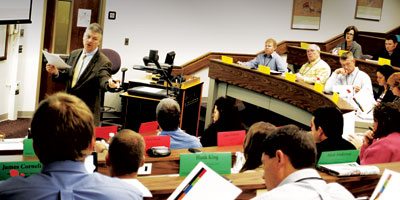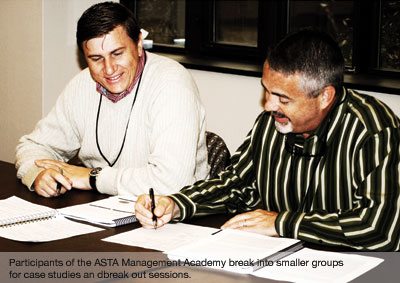Celebrating a Quarter-Century
The American Seed Trade Association Management Academy, held each spring in partnership with Purdue University’s Center for Food and Agricultural Business, celebrated its twenty-fifth birthday this year—and in the face of a rapidly evolving industry, it was one to remember.
There are a few birthdays that represent significant milestones—getting a driver’s license at 16, the right to vote at 18 and the freedom to legally drink alcohol at 21. Lower car insurance and renting a vehicle without extra penalties are highlights of a person’s twenty-fifth birthday, but for the American Seed Trade Association Management Academy, turning 25 this year meant much more.
“This was a historic year to celebrate a program that brings together experts in agriculture management, economics and business, along with world-renowned professors, to deliver education to the seed industry’s future leaders,” says Andy LaVigne, president and CEO of ASTA. “These are people who will continue to provide leadership, innovation and direction for our rapidly evolving industry.”
In 1987, ASTA partnered with Purdue University’s Center for Food and Agricultural Business to develop the academy, which presents emerging seed industry leaders with a broader perspective of the industry, the important issues it faces and best management practices to navigate the business environment.
As the center’s longest-running program, the academy has been a success over the past quarter-century, boasting more than 1,150 graduates. But today’s ever-changing and more complex agribusiness climate has necessitated a new set of skills in seed industry leaders.
“It’s going to take a broad set of skills to manage this swiftly changing industry,” says Allan Gray, the center’s director and a Purdue professor of agricultural economics. “As participants grow in their leadership capabilities, we want to make sure that they’ve thought about all of the pieces of their business, and how they all fit together.”
Patterned like a mini-MBA, the academy exposes participants to concepts in strategy, finance, marketing, human resources and leadership. This year’s academy, held March 5 to 9 at Purdue University’s West Lafayette, Ind., campus, brought together 43 seed industry representatives from across the United States, Canada and Germany to learn management techniques and strategies, with a focus on managerial decision-making.
Key Takeaways
Mimi Ricketts, trait stewardship manager at Monsanto, traveled from the greater St. Louis area to attend. According to Ricketts, after participating in the academy she is “more knowledgeable on the inter-connectivity of the functions within an organization.”
“This program has been a fantastic opportunity to network with people who work in a variety of capabilities throughout the industry,” adds Ricketts. “What sticks in my mind is that everything is inter-related. Marketing costs affect distribution, which in turn affects R&D, finance, accounting—on down the line.”
The academy offers participants a chance to think broadly about agriculture and the direction the industry is heading. Gray noted that during a discussion about drivers of change in agriculture—changes in population, technology and government regulations and their implications on the seed industry—participants realized that in the near future, seed companies will need to take on a lot of risk.
“Risk is ratcheting up very quickly across a number of different factors,” Gray says. “Moving forward, it’s going to be very difficult for an individual company to embrace all of the complexities of the industry.”
According to Gray, this means companies will need to find ways to work together. Major players in the seed industry will need to collaborate, and yet be competitive, all at the same time.
“How is it possible to both collaborate and compete?” says Gray. “That’s a new skill set that emerging leaders in agriculture will need to learn.”
Working Together
Companies sending participants to the academy have represented all segments of the seed business, including the vegetable, garden, corn, soybean, equipment and turf grass marketplaces.
According to Aissa Good, senior project manager at the Center for Food and Agricultural Business, the diversity across participants’ industry sectors, job specialties and geographic locations provides a rich environment for the exchange of ideas.
“The participants can learn so much by interacting with one another because they all have different experiences within the industry,” Good explains. “Through hands-on exercises and small-group work, they are reinforcing concepts and tools taught in the classroom, while also gaining exposure to different business areas and industry sectors along the way.”
Each year, world-class Purdue University faculty work to blend current issues and trends into the sessions to create a comprehensive, timely experience for participants. Featured topics this year included creating and communicating value through sales and marketing efforts, the fundamentals of financial management and what impacts a company’s profitability, effective supply chain management, leading change within an organization and using business strategy tools to position a company.
“This was a great program—it motivated me and made me excited about my job,” says Brooke Murphy, quality assurance manager at Germains Seed Technology in Gilroy, Calif. “I am leaving with many tools I can use to manage and empower my team more. The instructors and staff were outstanding and truly care about what they are doing.”
As the industry continues to evolve, so will the ASTA Management Academy. Its next major milestone will be celebrating 30 years in 2017 and, until then, ASTA and Purdue will strive to earn testimonials like that of 2012 participant Mark Salvador, senior manager of biotechnology affairs and industry at Pioneer Hi-Bred International in Johnston, Iowa: “The best professional development program I’ve ever attended in my 10 years of experience, no kidding.”
Kristyn Kapetanovic
Editor’s Note: Kristyn Kapetanovic is the marketing assistant at the Center for Food and Agricultural Business at Purdue University. She can be reached at kristyn@purdue.edu.














